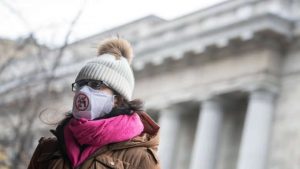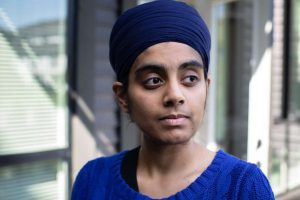Quebec Superior Court upholds religious symbols ban, but English-language schools exempt

The Quebec Superior Court has struck down some sections of the province’s secularism law, but also ruled its most controversial provisions are constitutional.
Sikh teacher moves to B.C. over Quebec law banning religious symbols in public-sector jobs
In a ruling handed down Tuesday, Justice Marc-André Blanchard said the Quebec government has the right to restrict what religious symbols are worn by government employees, such as teachers, police officers and prosecutors.
But he also said the law can’t be applied to English schools because it violates minority language education rights, protected under Section 23 of the Charter of Rights and Freedoms.
Members of the province’s National Assembly also can’t be forced to provide services to the public with their faces uncovered, Blanchard said.
In other words, MNAs are allowed to wear religious symbols that cover their faces, such as a niqab, in accordance with Section 3 of the charter, which guarantees citizens the right to be eligible to be a member of a legislature.
Simon Jolin-Barrette, Quebec’s justice minister and the architect of the law, said the province plans to appeal the ruling. He said the court’s decision threatens to divide the province along linguistic lines and create two categories of Quebecers.
“We don’t agree with the judgment,” he said. “We need to keep united in Quebec, and all the laws that are adopted here at the National Assembly have to apply to everyone.”
Ruling ‘bittersweet’
In a statement, the English Montreal School Board said it was “elated” with the decision to exempt English-language school boards.
“We value the diversity of our students and staff and respect their personal and religious rights, which are guaranteed both by the Canadian and Quebec Charters of Rights,” said board chair Joe Ortona.
But teacher Amrit Kaur, a Sikh woman from Montreal who wears a turban (dastar), described the ruling as “bittersweet.”
During the trial last November, Kaur told the court she was forced to take a teaching job in British Columbia after she finished her education degree in 2019.
On Tuesday, Kaur said she is reminded of the many teachers trying to work in the French system “who can’t teach and they have to re-evaluate what they’re going to do with their lives.”
“My heart really goes out to them and I’m thinking about them a lot today,” she said.

Muslim women among most affected
The 240-page ruling comes roughly a year and a half after the Coalition Avenir Québec government passed Bill 21, which bans some civil servants from wearing religious symbols at work.
Among the largest group affected by the ban are Muslim women, who are no longer allowed to wear hijabs if they work as public teachers, prison guards or government-paid lawyers.
The restrictions were necessary, the government said, to protect Quebec’s unique version of secularism, or laicity.
Civil liberties groups, including the National Council of Canadian Muslims and the Canadian Civil Liberties Association, began filing lawsuits against Bill 21 as soon as it was passed. At a trial this fall, Blanchard heard four different lawsuits, each attacking different aspects of the law.

The lawsuits had to negotiate the protections provided to the law by Section 33 of the Canadian Charter of Rights and Freedoms, the notwithstanding clause. It shields the law from claims the ban is unconstitutional because it violates freedom of religion or basic equality rights.
Tuesday’s decision marks the first time a court has issued an opinion on the law’s constitutionality. It is, however, highly unlikely to settle the matter.
Most legal experts expect the issue will eventually be appealed to the Supreme Court of Canada.
Michael Bryant, the executive director of the Canadian Civil Liberties Association, said the judgment “sets us up well for an appeal,” given that it acknowledges the harm the law causes.
“Of course, everybody who cares about what this law does to people’s dignity are disappointed that that law continues,” he said.
“But I would say that, legally, I am heartened as to what the future holds because I think we’re well set up to make a very strong appeal.”








Redes Sociais - Comentários